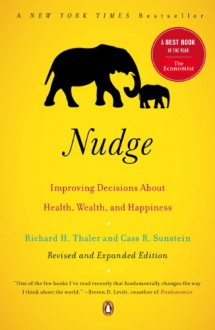
Nudge is like making a default choice so that people tend to not make a choice could benefit nevertheless.
OK. Study show that people tend not to make changes on their default tone settings on their phone, even if they have a lot more choices.
People have automatic (system 1) thinking and reflective (system 2) thinking.
Unfortunately, election is most likely to be system 1 thinking. So candidates that go for longer explanation of policies lost out if they are not also very attractive.
Framing is another way to nudge toward a decision. And people being passive decision makers. That's demonstrate in TV viewing and subscription.
The funny bits that could be repeated to your friends
"Clocky", the alarm clock that is designed to run and hide so that you have to get up and find it in order to make it stop.
"Mental budget" that hold money in different mental jar for food and rent. The mental budget for saving and credit debt. We feel different about money depends on how we see them in our minds.
We need a "fun and entertainment" account if we don't spend enough to make ourselves happy.
The stale popcorn experiment is cool, people would eat if it is in front of them.
Telling people that other people are "voting" would make more people come out and vote. And just by asking them if they are intended to vote on the eve of election would make more of them vote.
(The opposite is true. For reporting low turn out rate would make more people not to vote.)
How could the election helpers not know about this very important study?
Must tell the world.
Also, telling other people are drinking less, or don't smoke would help to reduce drinking and smoking.
Important things I'm learning here.
The retirement fund story from Sweden reminds us that having a lot of choices might be overwhelming. That government could have made a default choice, like organ donation when people get their driver license.
The best bit is about choice in education that I started this week.
On Marriage
The idea is to use civil union in replace of legal marriage. So marriage is more ceremonial instead of legal and practical.
The stuff that I slight dislike, is giving respect to religion, but for the energy that is wasted, maybe being superficially respectful to nonsense isn't such a bad idea.
They kind of compare the going into writing a book together like a marriage. The contract make them try to stick to the plan, but it wouldn't make them best friends, or have lunch together at least once a week. This is more like two friends talking about how they would be friends, and the contract is just an added part of "nudge" for them to finish this project.
Conclusion
Seriously, for those who want better governance, and better policy to help people, this is a must read.
I enjoyed it. Although some of the points are kind of repeated, while I'm internally saying "yeah yeah Professors, you said it before", I still nodding my head in agreement.
They are try to nudge you too, so they seems a bit hold back, less pushy, when they try to persuade you that it will work, and the world is better when people make better decision for themselves.
If you must go through this book quickly, you might skip some of the examples, but don't skip the theory, for that is the part that you will like to remember later on.
Enjoy.


 Log in with Facebook
Log in with Facebook 







